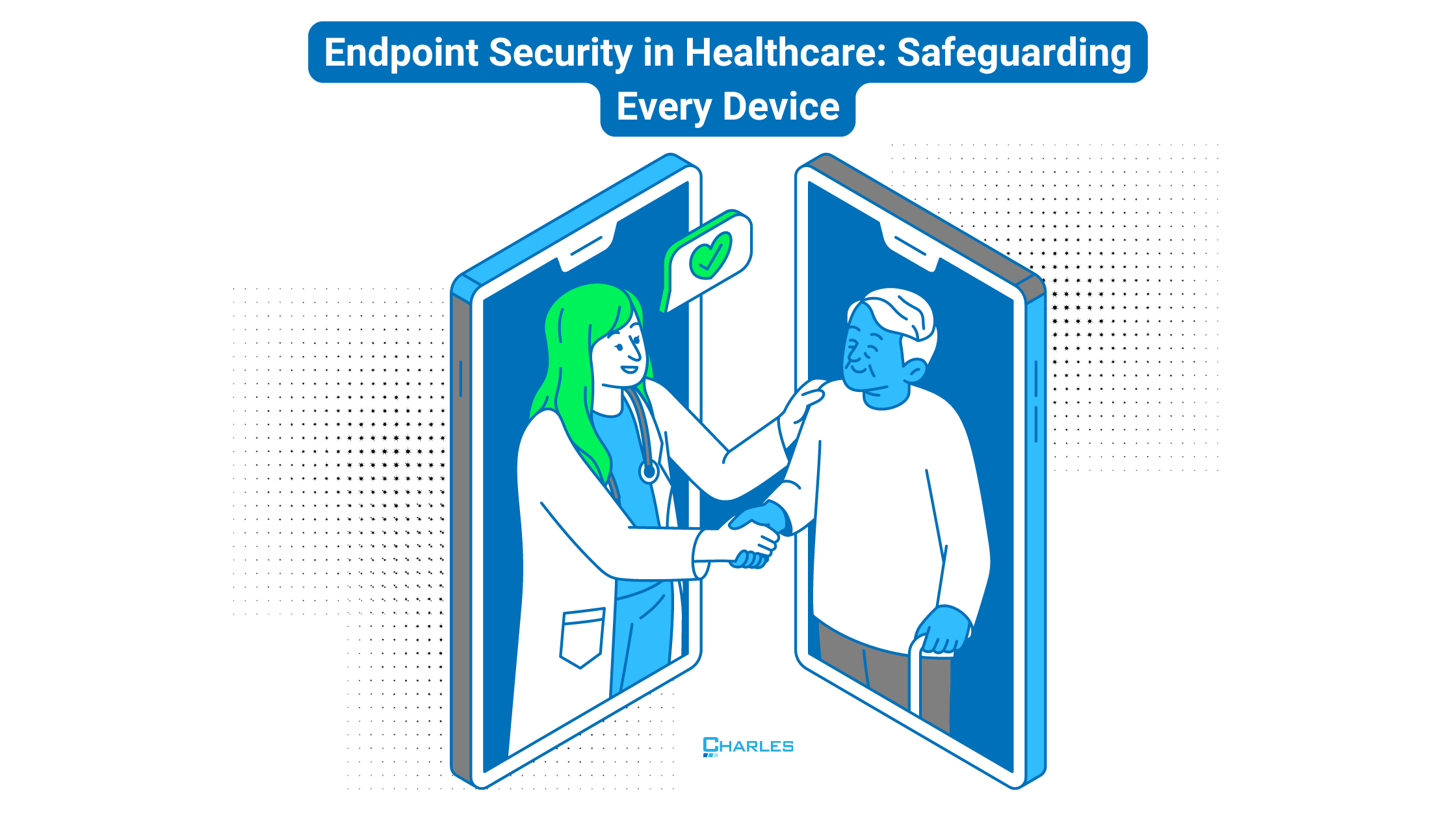
Introduction: The Critical Need for Endpoint Security in Healthcare
In the healthcare sector, it is especially important to protect sensitive patient data. With the rapid expansion of connected devices, every endpoint—whether it's a mobile device, workstation, or medical equipment—poses a potential entry point for cyber threats. That means endpoint security is no longer optional but necessary to safeguard patient information. That is to ensure operational continuity and maintain compliance with healthcare regulations such as HIPAA.
This blog will explore the importance of understanding endpoint security in healthcare, the unique risks healthcare devices face, best practices for securing endpoints, tailored solutions for healthcare, and the vital role compliance plays in keeping healthcare environments safe.
Understanding Endpoint Security in Healthcare
Endpoint security refers to the protection of devices that connect to a network, such as computers, tablets, mobile phones, and medical devices. In healthcare, the stakes are particularly high due to the sensitive nature of patient data and the critical systems these endpoints connect to. With the rise of telemedicine, mobile healthcare apps like MyChart, and interconnected medical devices, healthcare organizations face an ever-growing number of vulnerable access points.
Effective endpoint security in healthcare involves more than just basic antivirus software. It requires strategies that safeguard devices from malware, phishing attacks, unauthorized access, and data breaches. This is important for ensuring that patient information remains secure, healthcare operations run smoothly, and organizations remain compliant with regulations like HIPAA. By understanding endpoint security, healthcare providers can better protect both their patients and their systems.
The Unique Risks Facing Healthcare Devices
Healthcare devices face unique risks that require specific precautions to protect patient data. These devices are primarily designed for medical functionality and patient care, often leaving cybersecurity as an afterthought. This can lead to serious vulnerabilities. For example, medical devices may run on outdated software or miss critical security updates, making them easy targets for cyberattacks. Additionally, weak or default passwords are commonly used, increasing the risk of unauthorized access.
The stakes are high. According to Definitive Healthcare, 80% of the 739 data breaches reported in 2023 were caused by hacking or IT incidents. Cybercriminals can exploit unsecured endpoints to infiltrate networks, potentially compromising patient safety and confidentiality. Without strong cybersecurity measures, healthcare organizations are left exposed, making it vital to prioritize security with patient care.
Best Practices for Securing Healthcare Endpoints
Securing healthcare endpoints requires an approach that prioritizes both device protection and data security. Key best practices include:
-
Implementing Device Encryption
Encrypting devices transforms sensitive data into unreadable code, making it nearly impossible for unauthorized users to access or decipher information. This is a critical measure for safeguarding patient data. -
Regular Software Updates and Patch Management
Keeping devices up to date with the latest security patches is essential. Regular updates address known vulnerabilities, reducing the risk of exploitation by hackers targeting outdated software. -
Multi-Factor Authentication for Device Access
Multi-Factor Authentication (MFA) strengthens security by requiring users to verify their identity through two or more methods, such as a code sent to a mobile device or biometric data like a fingerprint. This adds another layer of protection against unauthorized access. -
Implementing Access Controls
Strict access controls ensure that only authorized personnel can access sensitive patient data or specific devices. This limits exposure and minimizes the risk of data breaches by restricting access to those who need it to perform their jobs. -
Cybersecurity Awareness Training for Employees
Educating healthcare staff on common cyber threats and best practices for protecting sensitive information is essential. Regular training helps employees recognize potential threats, such as phishing, and equips them with the knowledge to safeguard patient data.
By implementing these practices, healthcare organizations can strengthen their endpoint security and reduce their risk of cyber threats.
Endpoint Security Solutions Tailored for Healthcare
To effectively safeguard healthcare organizations, specialized endpoint security solutions are key. Given the unique demands of protecting patient data and critical medical devices, healthcare organizations must adopt tailored approaches that go beyond standard security practices.
One of those key solutions is network segmentation and monitoring. Network segmentation involves dividing a network into smaller, isolated segments to prevent unauthorized access to critical systems. This ensures that even if one segment is compromised, attackers can’t easily move across the network to access sensitive data. Coupled with continuous network monitoring, healthcare organizations can quickly detect unusual activity, such as unauthorized access attempts or data transfers, and respond to threats before they escalate.
Another solution is using AI and automation to detect threats. Artificial intelligence (AI) and automation tools have become super helpful in identifying and mitigating cyber threats. In healthcare, AI can continuously analyze network traffic and device behavior, flagging suspicious activities in real-time. Automated responses can isolate compromised devices, apply security patches, or trigger alerts for human intervention. These technologies enhance an organization’s ability to rapidly respond to threats, minimizing potential damage to patient data and operational systems.
By leveraging these solutions, healthcare organizations can ensure more robust endpoint security, protecting the privacy of their patients.
The Role of Compliance in Healthcare Endpoint Security
Compliance plays a critical role in healthcare endpoint security in that it ensures that organizations adhere to regulations designed to protect patient data and maintain system integrity. Laws such as the Health Insurance Portability and Accountability Act (HIPAA) and the Health Information Technology for Economic and Clinical Health (HITECH) Act impose strict requirements on how healthcare organizations manage and secure sensitive information, particularly at the endpoint level.
To remain compliant, healthcare providers must implement security measures that align with these regulations. This includes encryption of devices, maintaining audit trails, and enforcing access controls to limit who can view or modify patient data. Regular risk assessments and security audits are also mandated, helping organizations identify vulnerabilities and mitigate potential risks before they lead to breaches.
Non-compliance can result in severe penalties, including financial fines and reputational damage. By embedding compliance into their cybersecurity strategies, healthcare providers not only protect patient data but also ensure operational continuity and maintain the trust of regulators and patients.
Conclusion: Ensuring Comprehensive Security for Healthcare Devices
All in all, securing healthcare devices is essential for protecting patient data, ensuring operational efficiency, and maintaining regulatory compliance. From implementing encryption and multi-factor authentication to leveraging AI-driven threat detection, healthcare organizations must take a multifaceted approach to endpoint security. By following best practices and utilizing tailored solutions, healthcare providers can safeguard their devices and networks against the threat of cyberattacks.
At Charles IT, we understand the unique challenges that healthcare organizations face when it comes to securing their endpoints. Our expert team provides security solutions designed to protect every device, from patient records to critical medical systems. Contact us today to learn how we can help your organization achieve a higher level of security and compliance.




